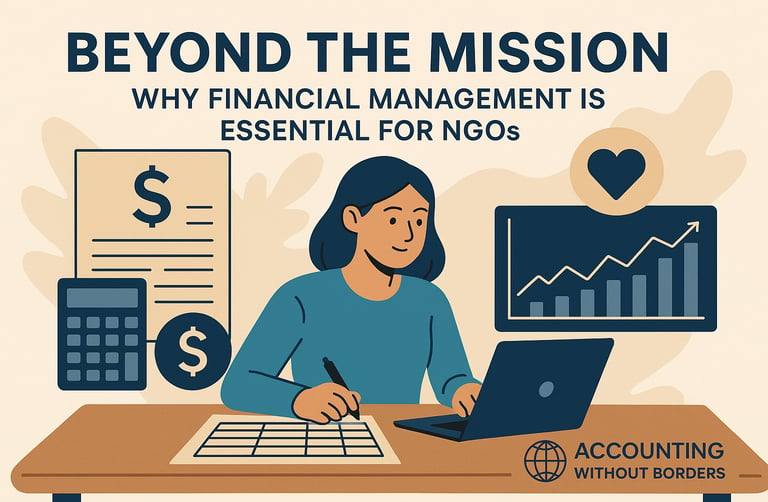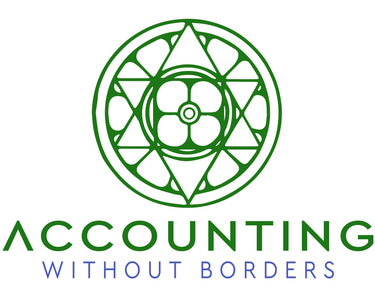Beyond the Mission
Why Financial Management is Essential for NGOs
Accounting Without Borders
5 min read


organisation. Think of financial management like maintaining a vehicle – if you don't put in good fuel and provide regular service, it won't run efficiently and eventually might break down, preventing you from reaching your destination. At its heart, financial management for NGOs is about planning, organising, controlling and monitoring the financial resources of the organisation to achieve its objectives. It's a continuous cycle of Plan, Do, and Review. You plan your activities and associated costs, implement those plans by spending and receiving money, and then review how the actual situation compares to your original plans. Learning from this review then informs the next planning phase.
Why is Strong Financial Management So Crucial for NGOs?
Effective financial management isn't just about keeping records; it's fundamental to an NGO's success and survival in a challenging and competitive environment. Here are some key reasons why it's so important:
Accountability: NGOs have a moral and legal duty to be accountable for the funds and resources entrusted to them. This includes being accountable to donors who provide the money and the communities (beneficiaries) you work with. Good financial reporting systems make it easier to demonstrate that money is being used as intended.
Credibility and Trust: Keeping accurate financial records promotes integrity, accountability, and transparency. NGOs that maintain good accounts, create strong budgets, and produce accurate, timely financial reports inspire confidence and trust in their stakeholders, including funding agencies, partners, and beneficiaries.
Effective Resource Use: With increasing scarcity of donor funds, NGOs must ensure donated funds and resources are used properly and to the best effect to achieve their mission and objectives. Good financial management helps managers make effective and efficient use of resources. It helps get better value for money by comparing and assessing spending plans.
Attracting Funding: Donors often require NGOs to demonstrate financial soundness. Presenting good budgets and audited financial statements with funding proposals increases the likelihood of a favorable response. Strong financial management helps gain the respect and confidence of funding agencies.
Sustainability: Good practice in financial management helps NGOs prepare for long-term financial sustainability. Financial viability means keeping spending in balance with incoming funds at both operational and strategic levels.
Risk Management and Control: Poor financial control puts assets at risk of theft, fraud, or abuse. Establishing strong financial policies and procedures helps ensure resources are correctly and effectively used. It helps manage internal and external risks that can threaten operations and survival. Implementing strong internal controls safeguards assets, prevents fraud/errors, ensures accurate reporting, and protects staff.
Pillars of Sound Financial Management
While there's no one-size-fits-all system, effective financial management is built upon four fundamental "building blocks":
Accounting Records: Keeping accurate records of financial transactions is essential to show how funds have been used and provide information on how the organisation is managed.
Financial Planning: This is intrinsically linked to the organisation's strategic and operational plans. The budget is a cornerstone, acting as a financial plan and playing a key role in monitoring.
Financial Monitoring: With a budget set and records kept and reconciled, it's possible to produce financial reports for stakeholders. Internal reports help managers monitor progress, while external reports provide accountability.
Internal Control: A system of checks and balances to safeguard assets, manage risk, and detect errors or fraud.
These blocks are interconnected; neglecting one weakens the others. For instance, keeping detailed records is pointless if they aren't checked for errors (part of internal control), as inaccurate records lead to misleading reports.
Key Principles Guiding Good Practice
Underlying these building blocks are seven guiding principles (remembered by the mnemonic CAT VISA):
Consistency: Using financial policies and procedures consistently promotes efficiency and transparency.
Accountability: Explaining how funds, equipment, or authority have been used to those who provided them.
Transparency: Being open about activities and plans, providing accurate, complete, and timely financial reports.
Viability: Keeping spending in balance with incoming funds to ensure financial continuity and security.
Integrity: Operating with honesty and propriety, ensuring the accuracy and completeness of financial records.
Stewardship: Taking good care of financial resources and ensuring they are used for the intended purpose.
Accounting Standards: Using a system that observes internationally accepted accounting standards and principles.
Putting Financial Management into Practice
Implementing sound financial management involves using various tools and adopting best practices:
Budgets as Roadmaps: Budgets detail planned income and expenditure and are essential for planning, fundraising, and monitoring project implementation. Different types of budgets (Income & Expenditure, Capital, Cashflow forecast) serve different purposes. Activity-based budgeting is commonly used for project budgets. Budgets should be realistic, fully costed, and clearly documented.
Understanding Financial Reports: Reports are crucial for internal monitoring and external accountability. Key reports include Management Accounts (like budget monitoring reports and cashflow reports for internal use) and Annual Accounts (Balance Sheet and Income & Expenditure account for external stakeholders). Analyzing reports helps assess financial health and track progress.
Reporting to All Stakeholders: This includes detailed reports for donors, adhering to their specific requirements and explaining any significant variances. It also increasingly means reporting to beneficiaries (downward accountability), which builds trust, improves program decisions, and reduces risks. Reports for beneficiaries should be simple, relevant, and easy to understand, possibly using local languages and visuals.
Establishing Internal Controls: Policies and procedures should be in place to govern financial activities. Key controls include delegation of authority (clarifying who can approve transactions within certain limits) and separation of duties (sharing financial tasks among multiple people to prevent fraud and errors). Controls also cover cash handling, physical assets, and checking accounting records.
Navigating Audits: Annual audits are an independent check on financial records and systems. An external audit verifies if financial statements give a "true & fair" view. Donors may also require specific project audits. Audits enhance credibility and are often legally required. Being prepared with accurate, well-supported records is crucial for a smooth audit.
Preventing Fraud and Corruption: NGOs are vulnerable to fraud and corrupt practices. Robust internal controls, training, transparent reporting, and a clear "zero tolerance" policy towards bribes are essential preventative measures.
Building Capacity for Financial Health
NGOs often face challenges like limited financial capacity, managing complex donor requirements, and balancing administrative tasks with program work. This is where support and expertise can be invaluable. Organizations dedicated to strengthening NGO financial management, such as Mango, provide training, resources, and guidance. Leveraging technology, developing clear policies, and seeking mentorship or professional services can also significantly improve financial health.
Strong financial management isn't just an administrative burden; it is the engine that powers an NGO's mission, ensuring resources are used effectively, trust is maintained, and the organisation can continue its vital work for the long term. By embracing good financial practices, NGOs can enhance their impact and build a more sustainable future.
Non-governmental organizations (NGOs) are driven by powerful missions to make a difference in the world. Whether providing humanitarian aid, advocating for human rights, or implementing development programs, the core focus is always on impact. However, achieving this impact requires more than just dedication and passion; it requires robust financial management.
Often, financial management in NGOs is seen as a separate task left to finance staff, or it's given a low priority. But it is actually a vital part of overall program management and involves actively looking after the financial health of the
Copyright © 2023 Charity Finance Group. All rights reserved
AWB is a trading name of Accounting Without Borders Limited


If you have a general enquiry rather than a question for a specific partner, then please phone or email us and we will respond as quickly as possible
General enquiries:
UK & Europe +44 (0) 207 123 7061
US & Canada +1 (646) 914 0609
Email: hello@aw-b.org




